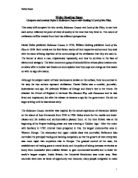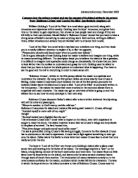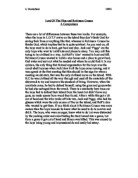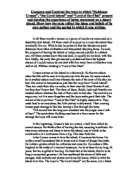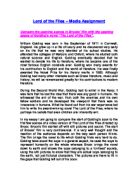The main character of Defoe’s book is Robinson Crusoe. Crusoe wanted to go to sea and explore rather than follow his father’s wishes and practise law; as it says on the first page: “My father…design’d me for the Law; but I would be satisfied with nothing but going to Sea.” Robinson Crusoe repeatedly went out to sea, even though after each expedition he always vowed to go home and stay on land. Eventually he was shipwrecked on an island and this is where the main narrative of the story begins. In this book he retains a strong sense of civilisation. This is shown after he rescues a savage from other savages who were about to eat him. He called him Friday after the day that he had met him, immediately taught him English and what his morals were: “…I likewise taught him to say Master, and then let him know, that was to be my name…I would give him Cloaths.” Crusoe also warned Friday off cannibalism and when he later rescues a Spaniard and Friday’s father from savages, he thought he had an example of society: “How like a King I looked… The whole country was my own…property; so that I had undoubted Right of Dominion…My people were perfectly subjugated: I was absolute Lord and Law-giver.” Order is brought out of chaos by civilisation.
The Lord of the Flies, on the other hand, was written when the Cold War was under way, nuclear tensions were high and people were nervous and fearful about the future of mankind. The story reflects Golding’s thoughts about civilisation – what in his view it was really like when the coating was stripped away. The story begins with the aeroplane crashing and the group of schoolchildren forming a semblance of a society with a democratically appointed leader. However as the narrative progresses, civilisation slowly falls apart; the main group of boys become savages and lives are taken. The book ends with all sense of civilisation being lost and the main character running for his life. Eventually civilisation is restored in the form of a Royal Navy cruiser, after spotting the signal that the boys initially lit, coming to rescue them.
The main character in Lord of the Flies is named Ralph and this story starts with another boy and him discussing what happened to the plane that they were in. After finding more children and no adults he called a meeting where he said, “Seems to me that we ought to have a chief to decide things.” This shows he had some views on the need for planning. Jack, another boy, also had some sense of civilisation: “After all, we’re not savages. We’re English; and the English are best at everything.” This is ironic, as later on he is the one to break all the rules and become the chief of the savages. Eventually they came to a disagreement over a signal they had lit to try and attract rescue ships. Ralph wanted to keep it going, but the other children wanted to hunt animals. The group acted like a savage tribe and eventually chooses to abandon civilised living: one of Ralph’s friends, Piggy, offers the choice:
“Which is better – to be a pack of painted niggers like you are, or to be sensible like Ralph is? … Which is better – to have rules and agree, or to hunt and kill? … Which is better, law and rescue, or hunting and breaking things up?”
The group then killed him and Ralph was running for his life. He represents a leader of a democratic society, which soon collapsed. “One chanced nothing! What could they do? Beat him? So what? Kill him? A stick sharpened at both ends.” At the end, when an officer from the rescue ship asks him who was in charge, he declared himself the leader again knowing that no one would dare challenge him in the face of civilisation protected by power. Ralph had no power in the story to protect his civilisation. Power lay with those who had the weapons.
In Robinson Crusoe human freedom, based on reason, is seen to be a higher way of living in the sixteenth and seventeenth centuries. Defoe notes the presence of religious differences and uses the situation to express his belief that freedom of belief should overrule religious bigotry:
“We had but three Subjects, and they were of three different Religions. My man Friday was a Protestant, his Father was a Pagan and a Cannibal, and the Spaniard was a Papist: however, I allow’d Liberty of Conscience throughout my Dominions.”
The opposite is true in Lord of the Flies as the group degenerates from civilised English schoolboys to primitive hunters only interested in the hunt and the kill. A pig’s head on a pole represents religion in this story, similar to a totem pole that the native Americans and other similar tribal people used. This represents a relapse to a less ‘reasonable’ form of existence.
Lord of the Flies is similar to Animal Farm by George Orwell, in that the impression of civilisation disappears and chaos reigns as they overthrow the person in control and all the order that goes with it. By contrast, Robinson Crusoe is similar in outlook to The Swiss Family Robinson (Johann Wyss) in that both retain an optimistic outlook even after they have been shipwrecked on the island. In both of the above books they find and make living areas, they capture wild animals to make a farm and they both are religious. A further modern example of the ‘Castaway’ plot is in TV shows like ‘Big Brother’ or other situations where a group of people is stranded in an area and has to adapt to keep any semblance of control. The pressure seems to affect the group and behaviour is altered compared with what is normally seen in public society.
The overall feel of Robinson Crusoe’s plot is optimistic - reflecting the times that Defoe lived in. Rene Descartes, a philosopher of the period, believed in the power of human spirit and reason over the force of nature. He said that ‘True knowledge must come from human reason alone. Defoe uses pirates and savages to symbolise a more primitive and uncontrolled force and uses Crusoe’s triumph over them to illustrate human spirit. Lord of the Flies, however, is pessimistic: all semblance of civilised society is stripped away. The two world wars undermined to ability of human beings to interact and use reason. Advances in society and technology had destroyed faith in rationalism and a belief grew that if left to our own devices, humans would in essence revert to animals. In the former novel the main character was on his own and it was only later did he have any company. There was no pressure on him to change into a savage and he could keep to the way he was without anything to transform him. Lord of the Flies, however, portrays children like a pack of wolves, with the most influential ones being the leaders. When one of them started to backslide into savagery, he took the rest with him. William Golding essentially believes that all humans are evil inside, but it is just that civilisation puts pressure on you to keep in place and if it were not for the controls present in civilised society, we would all be like the savage group. “There was no Piggy to talk sense. There was no solemn assembly for debate nor dignity of the conch.” The Navy officer who arrived to take them back to the waiting ship said, “I should have thought that a pack of British boys would have been able to put up a better show than that.” Robinson Crusoe, on the other hand, arrived home with Friday (his servant) and immediately wanted to set sail again for South America. “My true friend the widow earnestly diswaded me from it, and so far prevail’d with me, that for almost seven years she prevented my running abroad.” This shows that he still had an adventurous spirit and was willing to go out again confident that he would be able to cope with any troubles.
Both stories show that civilisation needs controls before it is effective; rules need to be enforced and reason alone may not be enough to ensure survival. Crusoe may not have survived without his gun and Ralph had nothing to protect himself with when the symbol of civilisation (the conch) was broken. In spite of this similarity, Defoe’s book presents a positive outlook for the future of humanity as civilisation spread across the globe, whereas Golding’s work suggested that the weapon would be used not to support civilisation, but to destroy it. Both reflect the world view of their times.



